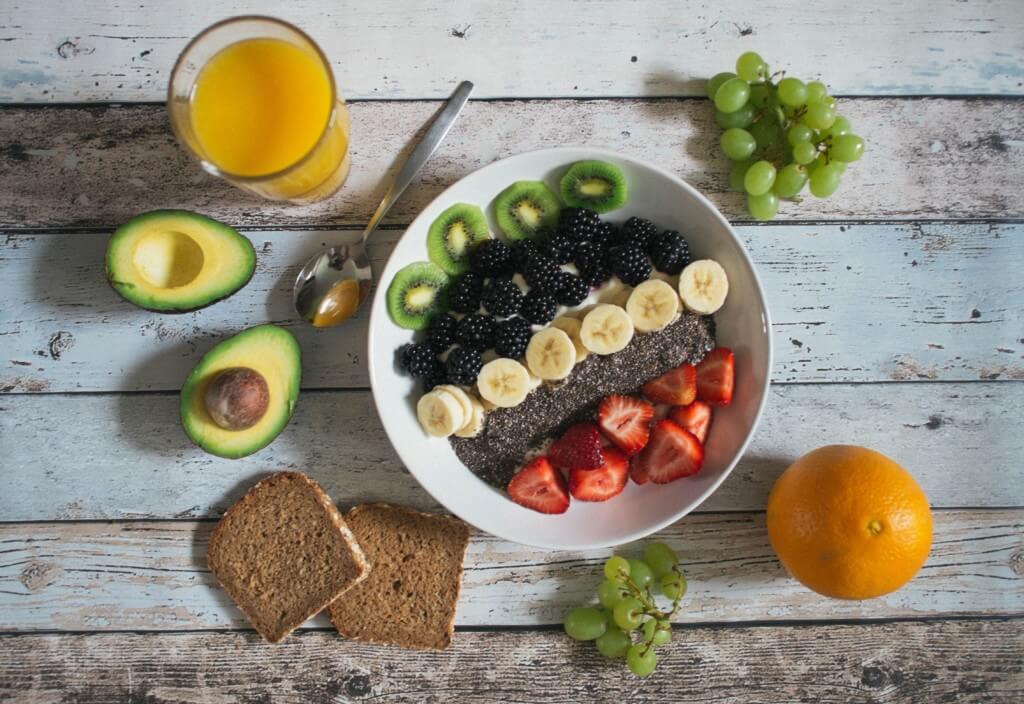I’m sick of living in a culture where downing two Red Bulls and a toaster waffle is an acceptable meal. When did forgetting to eat amidst the chaos of typical college life become something to brag about? With finals week approaching, we must remember that all nighters, infrequent showers and poor eating habits do not lead to success. Making a deliberate plan to take care of yourself does—even if it takes a bit more time and effort on your part. In the end, you’ll be more satisfied with your work (and less likely to collapse from exhaustion).
We’re not perfect, but improving our habits (even a little bit) can make finals week much more pleasant.
1. Eat Right

Boost your morning with breakfast. It’s probably one of my favorite meals simply because you’ll find so many great options—smoothie bowls, oats, toast. But it also serves as a fun way to kickstart your day with healthy carbs, proteins and fats that your body needs. Imagine leaving the house without charging your phone and expecting it to perform well all day. Not going to happen. Breakfast charges your body’s battery. Don’t skip it.
“When consuming carbohydrates, proteins and lipids, the goal is often to choose whole grains and fruit for carbohydrate sources,” Stacy Jones, a registered dietician from Penn State’s Health Promotion and Wellness department said. “Pick lean proteins and healthy unsaturated fats that promote health. Some great breakfast options include oatmeal with nuts and fruit, one or two eggs with whole grain avocado-topped toast, greek yogurt with fruit and granola or a whole grain bagel with peanut butter and banana.”
But what about snacks during the day? “Fruit with peanut butter, cheese and crackers, trail mix with nuts, dried fruit and whole grain cereal, hummus, or veggies and pita chips are great options to keep energy levels up and blood sugar levels stable,” Jones said. “If you are up late studying and are hungry because dinner was hours ago, having a snack to fuel your body is a great thing to do. While having a snack at night won’t impair sleep, having a large meal right before bed has been shown to impair sleep because your body cannot break down and digest your food while getting quality sleep.”
2. Get Enough Sleep
Befriend your bed. It might be tempting to pull an all-nighter, but your productivity falls faster than the price of holiday décor in January. “I feel that sleep is one of the most undervalued necessities,” Sarah Gochnauer, a junior in Biological Science and Health Professions at Penn State said. “Most students view sleep as a luxury that comes second to grades and, while academics are important, they are actually more dependent on sleep than many realize!”
According to Gochnauer, sleep deprivation impairs cognitive function and the ability to effectively store memories. In short, the sacrifice isn’t worth it. You won’t remember all that information you spent time learning if exhastion prevents your mind from resting! Try maintaining a consistent sleep schedule and aim for seven to nine hours of shut-eye each night for the best chance at success.
Set a time limit for yourself. If the clock strikes 11:30 p.m. and I still have work to do, I call it a night and plan to get up a little earlier the next day to finish. I figure I’ll work more efficiently with a rested mind than I would have had I stayed up late the night before. As a result, I’m able to maintain a sleep schedule and consistently wake up before my alarm goes off.
For all you Lorelai Gilmore wannabes out there, you might want to ease up on the Starbucks (or Luke’s Diner coffee). “Limit it to three cups and avoid all caffeine four to six hours before bed,” Jones said. “This is because caffeine is a stimulant with a half-life of six hours. In other words, even if you drink it six hours before bedtime, half of that caffeine will still be in your body when it’s time to hit the hay.”
3. Exercise
As someone who came late to the exercise game, I can’t speak highly enough about this. In high school I swam in stress, focusing only on academics and neglecting physical activity outside of gym class. In college, however, I discovered that I really enjoy both yoga and running to release tension. I’m no pro, but taking just 30 minutes to move each morning puts me in a good mood and improves my focus for the rest of the day.
“I like to hit the gym in the morning before I start studying and then do some relaxing yoga before I go to bed,” said Marissa Wegfahrt, a junior at Penn State studying Psychology. “This routine helps me focus throughout the day and allows me to get a better night’s sleep to recharge my brain for the next morning!”
If the gym isn’t your friend, don’t fret—small adjustments to your daily routine can make a big difference. Taking the stairs, biking to class or even squeezing in some jumping jacks before you head out the door can get your heart rate up. On days I’m feeling slugglish, I like to play a couple of high-energy songs and dance around my room like a maniac before settling down to study. Do what feels best.
4. Practice Mindfulness and Change Your Mindset
Consistent yoga practice helps you develop a greater self-awareness. I found myself feeling grateful for this unexpected “side-effect” of yoga. Mindfulness allows me to be honest with myself about what can be feasibly accomplished in a day. By setting aside some reflection time, I can organize my thoughts and mentally prioritize upcoming tasks on my to-do list.
With that said, sometimes no matter how hard I try, I can’t get my brain to shut off. On days like these, guided meditation apps like Calm and Headspace come in handy. They lead you through sessions and allow your brain to focus on something other than the laundry list of things you need to do. I find guided meditations to be especially helpful right before bed.
Even if meditation isn’t your thing, sometimes a simple attitude adjustment can make your day more pleasant. “It’s important to keep a positive attitude throughout finals week,” said Caitlyn Lazorka, a sophomore Nutrition Sciences major at Penn State. “Try to remember to take one thing at a time, and all the work won’t seem so daunting.”
5. Schedule Downtime

Relaxation crushes procrastination. As counterintuitive as it seems, relaxing serves as an opportunity get a breath of fresh air, stimulate the senses and recharge. Having downtime to look forward to keeps you motivated; even grabbing a bite to eat can count as a break.
“Taking a mental break from studying can be helpful to de-stress, clear your mind and refocus; fueling the body with nutrient rich foods are going to aid focus and energy levels and be more satisfying to the body than simply a bar, shake or energy drink on-the-go,” Jones said.
Lauren Shifflett, a junior Biobehavioral Health major, suggests studying in 30 to 60-minute increments rather than spending hours trying to push through the material. Just like any other part of your body, the brain requires periods of rest to recharge. Gluing yourself to your notes for hours induces stress, and as a result, you will experience poorer cognitive performance.
Whether you have a loaded finals week or are scot free as soon as class ends, consider integrating these habits into your life for a healthier and happier end to the semester. We’re rooting for you!



















